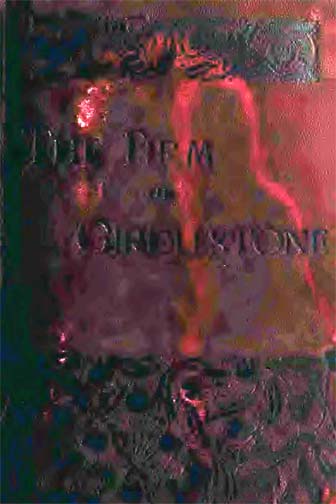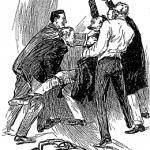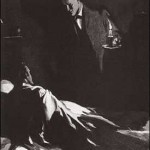
John Girdlestone’s private residence in Eccleston Square was a large and substantial house in a district which the wave of fashion had passed over in its westward course. It might still, however, be said to be covered by a deposit of eminent respectability. The building was stern and hard, and massive in its external appearance, but the interior was luxury itself, for the old merchant, in spite of his ascetic appearance, was inclined to be a sybarite at heart, and had a due appreciation of the good things of this world. Indeed, there was an oriental and almost barbarous splendour about the great rooms, where the richest of furniture was interspersed with skins from the Gaboon, hand-worked ivory from Old Calabar, and the thousand other strange valuables which were presented by his agents to the African trader.
After the death of his friend, Girdlestone had been as good as his word. He had taken Kate Harston away from the desolate house at Fulham and brought her to live with him. From the garrets of that palatial edifice to the cellars she was at liberty to roam where she would, and do what she chose. The square garden too, with its smoke-dried trees and faded lawn, was at her disposal, in which she might walk, or work, or read. No cares or responsibilities were imposed upon her. The domestic affairs were superintended by a stern housekeeper, who bore a quaint resemblance to Girdlestone himself in petticoats, and who arranged every detail of housekeeping. The young girl had apparently only to exist and to be happy.
Yet the latter item was not so easy as it might seem. It was not a congenial atmosphere. Her whole society consisted of the stern, unemotional merchant and his vulgar, occasionally brutal, son. At first, while the memory of her father was still fresh, she felt her new surroundings acutely, contrasting, as they did, with her happy Fulham home. Gradually, however, as time deadened the sting, she came to accommodate herself to circumstances. The two men left her very much to her own devices. Girdlestone was so engrossed in his business that he had little time to inquire into her pursuits, and Ezra, being addicted to late hours, was seldom seen except at breakfast-time, when she listened with awe to his sporting slang and cynical comments upon men and manners.
John Girdlestone had been by no means overjoyed upon the return of the Dimsdales from Edinburgh to learn that his ward had been thrown into the company of her young cousin. He received her coldly and forbade her to visit Phillimore Gardens for some time to come. He took occasion also to speak of Tom, and to assure her that he had received very serious accounts as to his spiritual state. “He is addicted to all manner of debasing pursuits,” he remarked, “and it is my particular wish that you should avoid him.” Learning that young Dimsdale was in London, he even took the precaution of telling off a confidential footman to walk behind her on all occasions, and to act either as an escort or as a sentry.
It chanced, however, that one day, a few weeks after her return, Kate found an opportunity of recovering her freedom. The footman had been despatched upon some other duty, so she bethought herself that a book was to be bought and some lace to be matched, and several other important feminine duties to be fulfilled. It happened, however, that as she walked sedately down Warwick Street, her eyes fell upon a very tall and square-shouldered young man, who was lounging in her direction, tapping his stick listlessly against the railings, as is the habit of idle men. At this Kate forgot incontinently all about the book and the lace, while the tall youth ceased to tap the railings, and came striding towards her with long springy footsteps and a smiling face.
“Why Cousin Tom, who would have thought of meeting you here?” she exclaimed, when the first greetings had been exchanged. “It is a most surprising thing.”
It is possible that the incident would not have struck her as so very astonishing after all, had she known that Tom had spent six hours a day for the last fortnight in blockading the entrances to Eccleston Square.
“Most remarkable!” said the young hypocrite. “You see, I haven’t anything to do yet, so I walk about London a good deal. It was a lucky chance that sent me in this direction.”
“And how is the doctor?” Kate asked eagerly. “And Mrs. Dimsdale, how is she? You must give my love to them both.”
“How is it that you have never been to see us?” Tom asked reproachfully.
“Mr. Girdlestone thinks that I have been too idle lately, and that I should stay at home. I am afraid it will be some little time before I can steal away to Kensington.”
Tom consigned her guardian under his breath to a region warmer even than the scene of that gentleman’s commercial speculations.
“Which way are you going?” he asked.
“I was going to Victoria Street to change my book, and then to Ford
Street.”
“What a strange thing!” the young man exclaimed; “I was going in that direction too.” It seemed the more strange, as he was walking in the opposite direction when she met him. Neither seemed inclined to make any comment upon the fact, so they walked on together. “And you have not forgotten the days in Edinburgh yet?” Tom asked, after a long pause.
“No, indeed,” his companion answered with enthusiasm. “I shall never forget them as long as I live.”
“Nor I,” said Tom earnestly. “You remember the day we had at the
Pentlands?”
“And the drive round Arthur’s Seat.”
“And the time that we all went to Roslin and saw the chapel.”
“And the day at Edinburgh Castle when we saw the jewels and the armoury. But you must have seen all these things many times before? You could not have enjoyed it as much as we did for the first time.”
“Oh yes, I did,” Tom said stoutly, wondering to himself how it was that the easy grace with which he could turn compliments to maidens for whom he cared nothing had so entirely deserted him. “You see, Kate-well—you were not there when I saw them before.”
“Ah,” said Kate demurely, “what a beautiful day it is? I fancied in the morning that it was going to rain.”
Tom was not to be diverted from his subject by any meteorological observations. “Perhaps some time your guardian will allow the dad to take you on another little holiday,” he said hopefully.
“I’m afraid he won’t,” answered Kate.
“Why not?”
“Because he seemed so cross when I came back this last time.”
“Why was he cross?” asked Tom.
“Because—” She was about to say that it was because she had been brought in contact with him; but she recollected herself in time.
“Because what?”
“Because he happened to be in a bad temper,” she answered.
“It is too bad that you should have to submit to any one’s whims and tempers,” the young man said, switching his stick angrily backwards and forwards.
“Why not?” she asked, laughing. “Everybody has some one over them.
If you hadn’t, you would never know right from wrong.”
“But he is unkind to you.”
“No, indeed,” said Kate, with decision. “He is really very kind to me. He may appear a little stern at times, but I know that he means it for my own good, and I should be a very foolish girl if I resented it. Besides, he is so pious and good that what may seem a little fault to us would appear a great thing in his eyes.”
“Oh, he is very pious and good, then,” Tom remarked, in a doubtful voice. His shrewd old father had formed his own views as to John Girdlestone’s character, and his son had in due course imbibed them from him.
“Yes, of course he is,” answered Kate, looking up with great wondering eyes. “Don’t you know that he is the chief supporter of the Purbrook Street Branch of the Primitive Trinitarians, and sits in the front pew three times every Sunday?”
“Ah!” said Tom.
“Yes, and subscribes to all the charitable funds, and is a friend of Mr. Jefferson Edwards, the great philanthropist. Besides, look how good he has been to me. He has taken the place of my father.”
“Hum!” Tom said dubiously; and then, with a little pang at his heart,
“Do you like Ezra Girdlestone too?”
“No, indeed,” cried his companion with energy. “I don’t like him in the least. He is a cruel, bad-hearted man.”
“Cruel! You don’t mean cruel to you, of course.”
“No, not to me. I avoid him as much as I can, and sometimes for weeks we hardly exchange a word. Do you know what he did the other day? It makes me shudder even to think of it. I heard a cat crying pitifully in the garden, so I went out to see what was the matter. When I got outside I saw Ezra Girdlestone leaning out of a window with a gun in his hands—one of those air-guns which don’t make any noise when they go off. And there, in the middle of the garden, was a poor cat that he had tied to a bush, and he had been practising at it for ever so long. The poor creature was still alive, but oh! so dreadfully injured.”
“The brute! What did you do?”
“I untied it and brought it inside, but it died during the night.”
“And what did he say?”
“He put up his gun while I was untying it, as if he had half a mind to take a shot at me. When I met him afterwards he said that he would teach me to mind my own business. I didn’t mind what he said though, as long as I had the cat.”
“Spoke like that, did he?” said Tom savagely, flushing up to his eyes.
“I wish I saw him now. I’d teach him manners, or—”
“You’ll certainly get run over if you go on like that,” interrupted
Kate.
Indeed, the young man in his indignation was striding over a crossing without the slightest heed of the imminent danger which he ran from the stream of traffic.
“Don’t be so excitable, Cousin Tom,” she said, laying her gloved hand upon his arm; “there is nothing to be cross about.”
“Isn’t there?” he answered furiously. “It’s a pretty state of things that you should have to submit to insults from a brutal puppy like that fellow Ezra Girdlestone.” The pair had managed by this time to get half-way across the broad road, and were halting upon the little island of safety formed by the great stone base of a lamp-post. An interminable stream of ‘buses—yellow, purple, and brown—with vans, hansoms, and growlers, blocked the way in front of them. A single policeman, with his back turned to them, and his two arms going like an animated semaphore, was the only human being in their immediate vicinity. Amid all the roar and rattle of the huge city they were as thoroughly left to themselves as though they were in the centre of Salisbury Plain.
“You must have a protector,” Tom said with decision.
“Oh, Cousin Tom, don’t be foolish; I can protect myself very well.”
“You must have some one who has a right to look after you.” The young man’s voice was husky, for the back part of his throat had become unaccountably dry of a sudden.
“You can pass now, sir,” roared the constable, for there was a momentary break in the traffic.
“Don’t go for a moment,” Tom cried, desperately detaining his companion by the sleeve of her jacket. “We are alone here and can talk. Don’t you think—don’t you think you could like me a little bit if you were to try? I love you so, Kate, that I cannot help hoping that my love is not all lost.”
“All clear now, sir,” shouted the constable once more.
“Don’t mind him,” said Tom, still detaining her on the little-island. “Since I met you in Edinburgh, Kate, I have seemed to be walking in a dream. Do what I will, go where I will, I still have you before my eyes and hear your sweet voice in my ears. I don’t believe any girl was ever loved more dearly than I love you, but I find it so hard to put into words the thoughts that I have in my mind. For Heaven’s sake, give me some little gleam of hope to carry away with me. You don’t dislike me, Kate, do you?”
“You know that I don’t, Cousin Tom,” said the young lady, with downcast eyes. He had cornered her so skilfully against the great lamp that she could move neither to the right nor to the left.
“Do you like me, then, Kate?” he asked eagerly, with a loving light in his earnest grey eyes.
“Of course I do.”
“Do you think you could love me?” continued this persistent young man. “I don’t mean all at once, and in a moment, because I know very well that I am not worthy of it. But in time don’t you think you could come to love me?”
“Perhaps,” murmured Kate, with averted face. It was such a very little murmur that it was wonderful that it should be audible at all; yet it pealed in the young man’s ears above the rattle and the clatter of the busy street. His head was very near to hers at the time.
“Now’s your time, sir,” roared the semaphoric policeman.
Had Tom been in a less exposed position it is possible that he might have acted upon that well-timed remark from the cunning constable. The centre of a London crossing is not, however, a very advantageous spot for the performance of love passages. As they walked on, threading their way among the vehicles, Tom took his companion’s hand in his, and they exchanged one firm grip, which each felt to be of the nature of a pledge. How sunny and bright the dull brick-lined streets appeared to those two young people that afternoon. They were both looking into a future which seemed to be one long vista of happiness and love. Of all the gifts of Providence, surely our want of knowledge of the things which are to come upon us is the most merciful, and the one we could least dispense with!
So happy and so light-hearted were these two lovers that it was not until they found themselves in Warwick Street once more that they came down from the clouds, and realized that there were some commonplace details which must be dealt with in one way or another.
“Of course, I may tell my own people, dearest, about our engagement?”
Tom said.
“I wonder what your mother will say?” answered Kate, laughing merrily.
“She will be awfully astonished.”
“How about Girdlestone?” asked Tom.
The thought of the guardian had never occurred to either of them before. They stared at each other, and Kate’s face assumed such an expression of dismay that her companion burst out laughing.
“Don’t be frightened, darling,” he said. “If you like, I’ll go in and ‘beard the lion in his den.’ There is no time like the present.”
“No, no, dear Tom,” she cried eagerly. “You must not do that.” It was impossible for her to tell him how especially Girdlestone had cautioned her against him, but she felt that it would never do to allow the two to meet. “We must conceal our engagement from Mr. Girdlestone.”
“Conceal our engagement!”
“Yes, Tom. He has warned me so often against anything of the sort, that really I don’t know what he would do if he knew about it. He would certainly make it very uncomfortable for me to live with him. Remember I am nearly twenty now, so in a little more than a year I shall be entirely free. That is not very long.”
“I don’t know about that,” Tom said doubtfully. “However, if you will be more comfortable, of course that settles the question. It seems rather hard, though, that we should have to conceal it, simply in order to pacify this old bear.”
“It’s only for a time, Tom; and you may tell them at home by all means. Now, good-bye, dear; they will see you from the windows if you come nearer.”
“Good-bye, my darling.”
They shook hands and parted, he hurrying away with the glad tidings to Phillimore Gardens, she tripping back to her captivity with the lightest heart that she had felt for a weary time. Passers-by glanced back at the bright little face under the bright little bonnet, and Ezra Girdlestone, looking down at her from the drawing-room window, bethought him that if the diamond speculation should fail it would be no hardship to turn to his father’s word.





